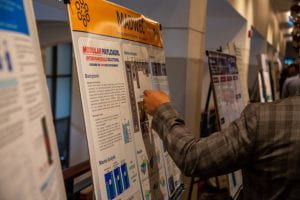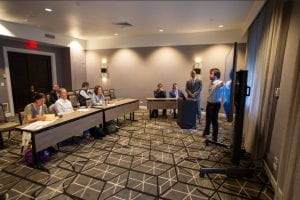Research in Ocean Sciences & Environmental Engineering
Presentation at the National Hydropower Association’s Waterpower Week in Washington D.C.

Group photo
We worked with Professors Daniel G. MacDonald and Mehdi Raessi to participate in the Marine Renewable Energy Collegiate Competition, which was held as part of the Waterpower Week (https://waterpowerweek.com/) in Washington D.C. in May 2023. Although we were not giving a formal poster or talk at the conference, we presented twice, the first was a business plan pitch, and the second was an outreach presentation, as well as presenting a poster, all as part of the competition. This travel was partially funded by the OUR, the US Department of Energy, and the National Renewable Energy Laboratory. We appreciate all the supports we received to present our work at the national level.
The Marine Energy Collegiate Competition (MECC) in Washington DC presented a pivotal platform to highlight our proficiency and commitment to Science, Technology, Engineering, and Mathematics (STEM) education. Our team participated in the Marine Energy Collegiate Competition (MECC) with the aim of showcasing and advancing our innovative technology that converts wave energy into usable electrical power.




Snapshots from the presentations
Our vision for a clean energy future is rooted in harnessing the inherent power of natural elements to generate sustainable electrical energy, fueling technological advancements. As we continue to push the boundaries of technology, it’s crucial that we minimize our environmental impact and reduce our carbon footprint. By tapping into the wealth of natural energy resources, we aim to unlock the next generation of technologies that allow us to coexist harmoniously with our environment.
Our project, the Maximal Asymmetric Drag Energy Converter (MADWEC), employs a ballast system and an underwater subsystem to create drag. This powers the mechanical Power Take-Off (PTO) system, converting wave energy into electrical energy that can be stored, offering a clean and sustainable way to harness wave energy.

